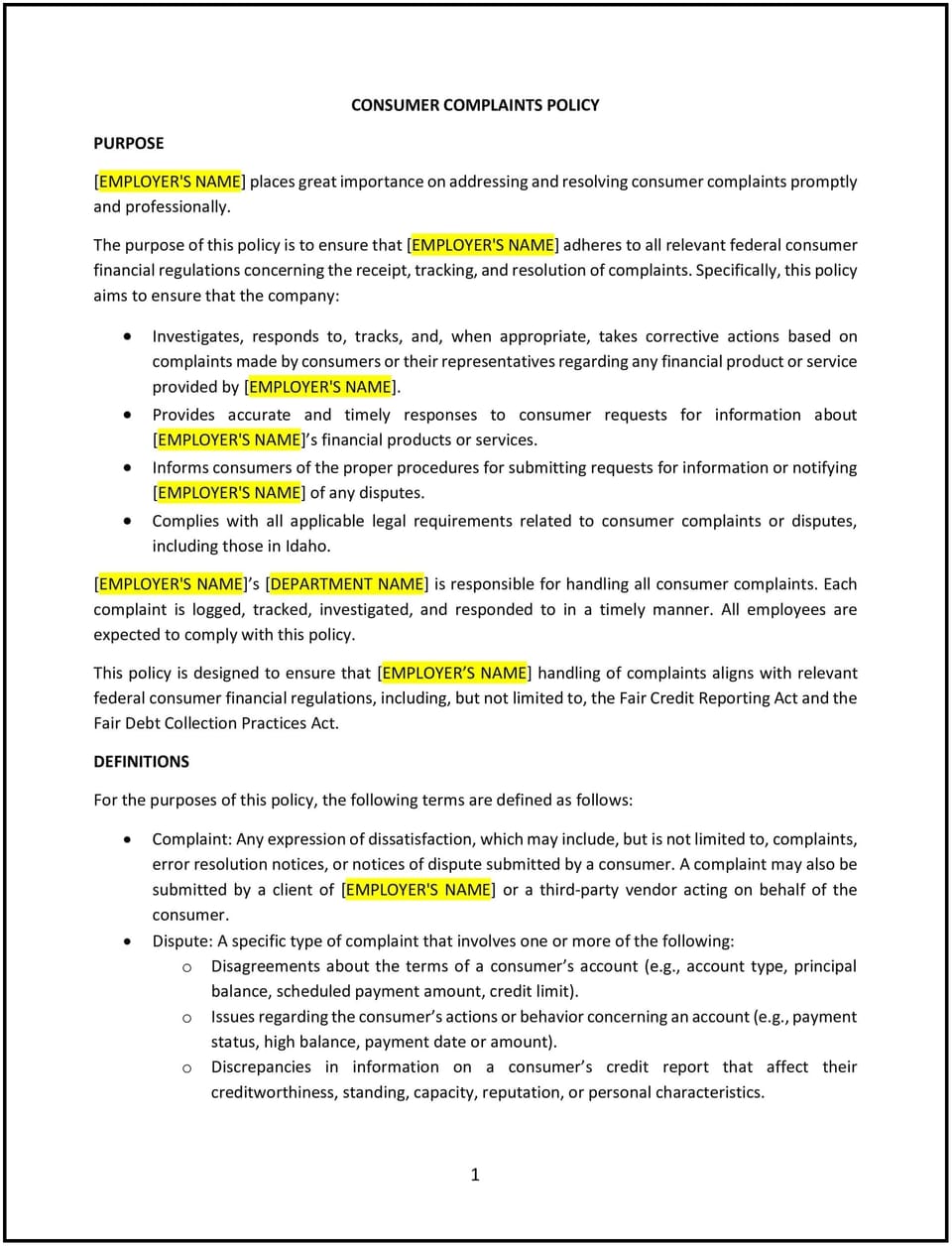Consumer complaints policy (Idaho): Free template

Consumer complaints policy (Idaho)
A consumer complaints policy helps Idaho businesses establish a structured process for addressing customer concerns, feedback, and disputes. This policy outlines the steps for receiving, investigating, and resolving complaints, as well as the timelines and communication protocols involved. It reflects the business’s commitment to customer satisfaction, transparency, and continuous improvement.
By implementing this policy, businesses can build stronger customer relationships, improve service quality, and maintain a positive reputation.
How to use this consumer complaints policy (Idaho)
- Define complaint categories: Specify the types of complaints the business will address, such as product quality, service issues, billing errors, or delivery problems.
- Establish reporting channels: Provide multiple avenues for customers to submit complaints, such as phone, email, online forms, or in-person at the business location.
- Outline investigation process: Describe the steps for investigating complaints, including gathering information, reviewing records, and consulting relevant team members.
- Set resolution timelines: Provide clear timelines for acknowledging complaints, conducting investigations, and communicating resolutions to customers.
- Communicate with customers: Outline the process for keeping customers informed throughout the complaint resolution process, including updates and final outcomes.
- Document complaints: Maintain records of all complaints, investigations, and resolutions to ensure accountability and identify trends for improvement.
- Review and update: Regularly review the policy to ensure it remains aligned with customer needs, business operations, and Idaho laws.
Benefits of using this consumer complaints policy (Idaho)
This policy provides numerous benefits for Idaho businesses:
- Enhances customer satisfaction: A clear and efficient complaint resolution process helps address customer concerns promptly, improving their overall experience.
- Builds trust and loyalty: Demonstrating a commitment to resolving complaints can strengthen customer relationships and encourage repeat business.
- Improves service quality: Analyzing complaint trends helps businesses identify areas for improvement and enhance their products or services.
- Reduces negative feedback: Addressing complaints effectively can minimize negative reviews and protect the business’s reputation.
- Provides clarity: A well-defined policy ensures consistent handling of complaints and reduces potential misunderstandings.
- Encourages accountability: The policy holds employees accountable for addressing complaints professionally and promptly.
- Aligns with best practices: A consumer complaints policy reflects modern customer service standards and can enhance the business’s reputation.
Tips for using this consumer complaints policy (Idaho)
- Communicate the policy effectively: Share the policy with customers through the business’s website, signage, and customer service interactions.
- Train employees: Provide training on the policy, complaint handling techniques, and the importance of customer satisfaction.
- Respond promptly: Acknowledge complaints quickly and provide customers with a clear timeline for resolution.
- Investigate thoroughly: Gather all relevant information and consult necessary team members to ensure a fair and accurate resolution.
- Document everything: Maintain detailed records of complaints, investigations, and resolutions to ensure accountability and identify trends.
- Review the policy regularly: Update the policy as needed to reflect changes in customer needs, business operations, or Idaho laws.
- Lead by example: Encourage leadership to model excellent customer service and demonstrate a commitment to resolving complaints effectively.
Q: Why should Idaho businesses have a consumer complaints policy?
A: A consumer complaints policy helps businesses address customer concerns effectively, improve service quality, and maintain a positive reputation.
Q: What types of complaints should businesses address?
A: Businesses should address complaints related to product quality, service issues, billing errors, delivery problems, or any other customer concerns.
Q: How should customers submit complaints?
A: Customers should be able to submit complaints through multiple channels, such as phone, email, online forms, or in-person at the business location.
Q: How quickly should businesses respond to complaints?
A: Businesses should acknowledge complaints promptly and provide a clear timeline for resolution, as outlined in the policy.
Q: How should businesses investigate complaints?
A: Businesses should gather relevant information, review records, and consult necessary team members to ensure a fair and accurate resolution.
Q: How should businesses communicate with customers during the complaint process?
A: Businesses should keep customers informed throughout the process, providing updates and final outcomes in a timely manner.
Q: How often should the policy be reviewed?
A: The policy should be reviewed annually or as needed to reflect changes in customer needs, business operations, or Idaho laws.
This article contains general legal information and does not contain legal advice. Cobrief is not a law firm or a substitute for an attorney or law firm. The law is complex and changes often. For legal advice, please ask a lawyer.


